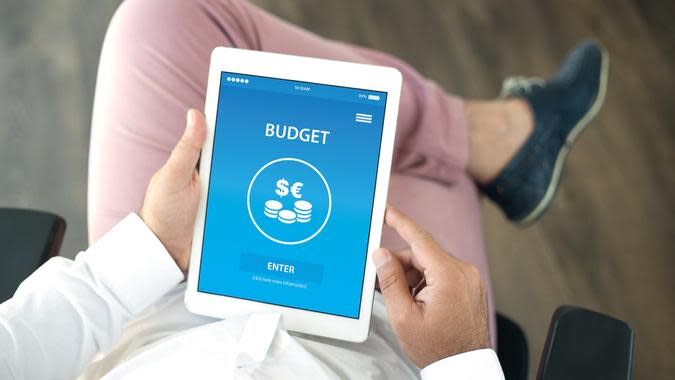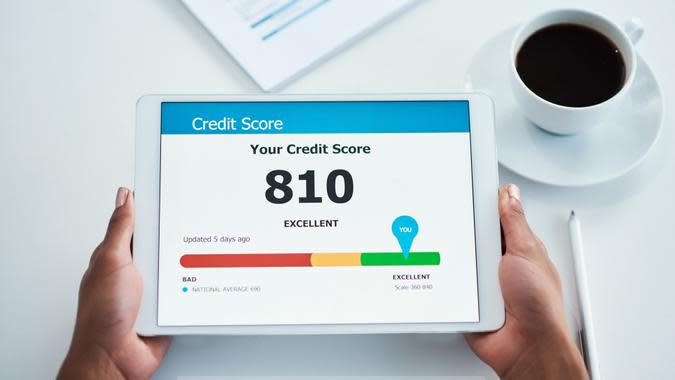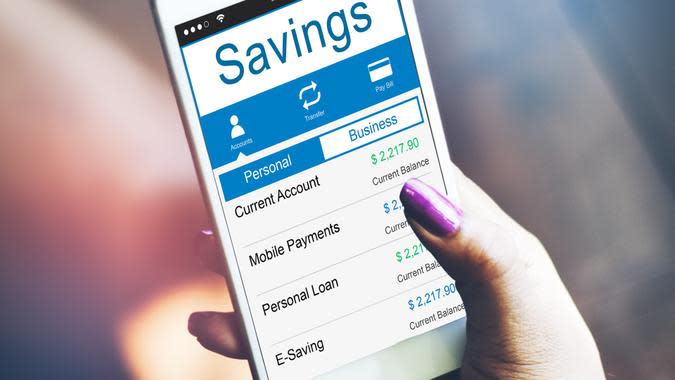Making more money is at the top of people’s financial goals for this year, according to a recent survey by GOBankingRates. The data, which looked at over 1,000 American adults, found that 18% cited earning more as a main priority — with 25% stating they wished to save more.
Check Out: 6 Ways to Tell If You’re Financially Smarter Than the Average American
Learn More: Do This To Earn Guaranteed Growth on Your Retirement Savings (With No Risk to Your Investment)
Unsurprisingly, Gen Zers were among those most preoccupied with making more and being able to put some money aside. And they’re not just thinking about it — they’re also planning on taking action. One poll shows that 66% of employees aged 18 to 27 intend to request raises in 2024.
While earning more is always something to aspire to, experts say you don’t necessarily need to make more money to build up your savings. What you need is to be more strategic with the resources you have.
“It’s a common misconception that one needs to boost their income to enhance their savings significantly,” said Mike Kojonen, financial advisor and owner of Principal Preservation Services. “However, the truth often lies in smarter budgeting and a deeper understanding of one’s financial flow.”
Here are some of the signs you just need to be savvier with the money you have.


You Don’t Have a Clear Financial Roadmap
“One significant insight from my experience is recognizing when your lifestyle inflation outpaces your income growth,” said David Brillant, tax, trust and estate lawyer at Brilliant Law Firm. “A common scenario involves clients who receive modest income increases but then significantly ramp up their spending on nonessential luxuries.”
He said this habit can erode potential savings, underscoring the importance of maintaining a balanced budget and prioritizing savings and investments over immediate gratification.
“The key is to have a clear financial roadmap,” he said, “one that accounts for your goals, expenses and income, adjusting your spending habits to ensure you’re allocating funds towards saving and investment opportunities.”
Discover More: Robert Kiyosaki Explains Why Saving Money Is the Wrong Way To Prepare for Retirement
Explore More: 3 Ways Upper Middle Class Retirees Stay Rich in Retirement
Sponsored: Owe the IRS $10K or more? Schedule a FREE consultation to see if you qualify for tax relief.


You’re Not Tracking Your Expenses
“Unless you are living paycheck to paycheck or barely scraping by, you can afford to build your savings,” said Jake Hill, finance expert and CEO of DebtHammer.
In most cases, he said, people miss out on opportunities to save because their spending habits need a serious overhaul.
“For example, if you frequently order takeout or treat yourself to small purchases,” he said, “you’re likely spending hundreds in unnecessary purchases each month.”
Reallocating that money to more important parts of your budget, he said, will enable you to prioritize your savings.
Ann Martin, director of operations of CreditDonkey, agrees that it all comes down to budgeting wisely.
“Most people who can comfortably afford their expenses simply need to cut back on unnecessary spending to boost their savings,” she said. “I suggest you start by tracking your day-to-day spending to identify areas of opportunity for cutbacks. For example, if you eat out for lunch every day, curtailing that habit can leave more money available to devote to savings.”
Find Out: You Can Get These 3 Debts Canceled Forever


You’re Giving Into Lifestyle Creep
According to David Kemmerer, CEO of CoinLedger, lifestyle creep is one of the biggest traps people fall into that prevents them from saving — even while earning decent income.
He said lifestyle creep occurs “when you receive a raise or a promotion or move to a new position where you’re making more than you were before, but quickly find that your lifestyle expands to take up the extra income.”
“If you notice that you’re still living paycheck to paycheck no matter how much you earn, there’s a good chance you’re suffering from lifestyle creep,” he explained. “And no amount of extra earnings will allow you to save more.
“In this case, I’d recommend sitting down and establishing a hard budget, working with a financial professional if needed to get your spending in check so you can save.”


You’re Not Prioritizing Financial Literacy
“Financial literacy plays a pivotal role in this context,” said Jenna Trigg, co-founder at Silver Fox Secure. “For instance, many of our clients realized that they don’t necessarily need to earn more to save more; rather, they need to spend smarter.”
She said this realization often comes from using tools and strategies that allow them to monitor their spending and understand their financial behaviors better.
“Personal banking management, when integrated with budget and bill pay oversight, can reveal unnecessary expenditures or highlight areas where you can cut back without significantly impacting your lifestyle.”


You’re Not on Top of Your Credit Score
According to Trigg, credit monitoring underscores another crucial aspect of saving: maintaining a healthy credit score.
“A good credit score can lead to lower interest rates on loans and credit cards, translating into substantial savings over time,” she said. “Many individuals overlook the impact of credit scores on their financial health, focusing solely on income as the driver of savings.”
By proactively protecting and improving your credit score, she said, you can reduce expenses tied to debt and allocate more towards savings.
She said this approach, along with a disciplined budgeting process, illustrates that enhancing your savings potential often requires a smarter allocation and oversight of existing resources rather than a simple increase in income.


You’re an ‘Emotional Spender’
“A transformative moment frequently occurs when clients genuinely understand the difference between wants and needs,” Kojonen said.
This discernment, he noted, often leads to a significant reduction in unnecessary spending.
He said, “I’ve seen clients achieve remarkable savings by auditing their monthly expenses and identifying areas where emotional spending, rather than thoughtful investment, was dictating their financial decisions.”
By reallocating these funds toward savings or investments, he said, you can improve your financial security without needing additional income sources.
Check Out: 7 Key Signs You’ve Reached Financial Freedom


You’re Indulging in Impulse Buys
“Too often, people believe that the only way to boost their savings is by increasing their income,” said Andy Chang, founder and CEO of The Credit Review.
However, he said, recognizing the signs that your earning is sufficient but your spending needs adjustment can be a pivotal moment in improving your financial health.
“One clear sign is if you’re frequently indulging in impulsive buys or nonessential luxury items, indicating a reshaping of your budget could bolster your savings.”


You’re Not Actually Using Saving or Investing Accounts
Another sign, according to Chang, is if you have money left over at the end of the month but it’s not being saved or invested.
“Choosing automated savings strategies can instantly change this dynamic,” he said.
Additionally, if you’re consistently meeting your essential expenses without stress but not growing your savings, he said, it’s an indication that reallocating funds from nonessential spending to your savings could significantly impact your financial future.
That said, Kojonen noted that choosing the right types of savings and investment accounts can also have a profound impact on your wealth accumulation.
“I often guide my clients toward setting up IRAs or contributing more towards their 401(k)s, especially if their employers offer matching contributions,” he said. “This approach not only maximizes their existing income but also secures their financial future through disciplined saving habits.
“While earning more can certainly facilitate greater savings, it’s not always the prerequisite for financial stability or growth.”
Through careful planning, budgeting and making educated investment choices, it’s possible to significantly improve your savings and overall financial health, Kojonen said.
“This methodology has been a cornerstone in my advisory role, helping clients to navigate their financial journey with confidence and clarity.”


You’re Not Monitoring Small, Recurring Purchases
If you have not reviewed your subscriptions and recurring payments in the last year, Chang said, you might be leaking money that could be effectively saved or invested.
“By recognizing these signs and adjusting accordingly,” he said, “you can enhance your savings and overall financial well-being without necessarily increasing your income.”


You’re Not Optimizing Tax Strategies
“Another aspect drawn from my work involves understanding tax implications on your income and how they affect your ability to save,” Brillant said. “For example, I’ve assisted clients in implementing tax-efficient saving strategies, such as utilizing tax-deferred accounts or harvesting tax losses.”
He said these strategies can help maximize the value of what you earn and, in turn, bolster your savings without you necessarily earning more money.
“It’s about making your money work smarter, not harder,” he said.
Estate planning — setting up trusts, for example — can offer tax benefits and protect assets, contributing to your overall savings goals.
“Through my practice,” Brillant said, “I’ve learned that building savings is less about the amount of money you make and more about how efficiently you manage and allocate your resources.”
Overall, experts note that implementing a strategic approach to spending, saving and investing — with a keen eye on tax implications — can significantly enhance your financial stability without the necessity of higher income.
More From GOBankingRates
This article originally appeared on GOBankingRates.com: 10 Signs You Don’t Need To Make More Money To Build Your Savings
